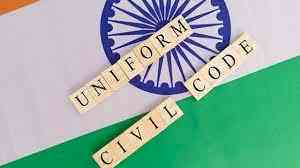Harmonising diversity: The quest for a Uniform Civil Code in India
Amid the intricate tapestry of India's diverse religious, cultural, and customary fabric, the proposition of a Uniform Civil Code (UCC) has emerged as a focal point of discourse over recent decades.

Jalis Akhtar Nasiri
New Delhi, July 27 (IANS) Amid the intricate tapestry of India's diverse religious, cultural, and customary fabric, the proposition of a Uniform Civil Code (UCC) has emerged as a focal point of discourse over recent decades.
This code, unifying civil laws governing marriage, divorce, inheritance, and adoption, seeks to replace the disparate personal laws of various religious communities that have prevailed for centuries. Although the idea of a single code dates back to colonial times, its enforcement was deferred due to the country's vast diversity.
Nonetheless, Article 44 of the Indian Constitution exhorts the pursuit of its implementation.
Current times witness intensified discussions, consultations, and deliberations on this critical matter, emphasising the need for fostering national unity, gender justice, and individual rights. While the framers of the Constitution envisioned its enforcement, it has remained an aspiration, sparking ongoing debates on its necessity and feasibility.
In a nation as diverse as India, where religions, cultures and customs intertwine so deeply, the concept of a Uniform Civil Code (UCC) has been a subject of much deliberations for the past few decades.
A common code governing all aspects of civil laws would aim to replace the vastly distinct personal laws of various religious communities that have hovered over issues of marriage, divorce, inheritance, and adoption since time immemorial. In order to further emphasise upon fostering national unity, gender justice, and individual rights, a uniform civil code is the need of the hour.
One of the first well-documented and voiced demands for a uniform civil code can be traced back to the colonial era when the British introduced English laws to bring consistency in various civil matters.
However, given the humongous variety and diverse composition of the country/communities, the framers decided not to enforce a single code immediately. It would be a grave injustice, however, to forget that the framers did envision a day when it would be enforced.
As can be seen from Article 44 of the Constitution of India, the state has been urged to strive towards its implementation in the near future.
In that context, numerous Law Commission reports, judicial pronouncements as well as departmental recommendations have suggested that fresh discussions must begin to discuss the said issue amidst its increasing relevance and importance. Of particular importance, the 21st Law Commission Report released a consultation paper on the reform of family law while the 22nd Law Commission decided to solicit ideas and views from the civil society and religious organisations last month.
While a common set of laws remained an unfulfilled aspiration, debates continued over its necessity and feasibility. Receiving an overwhelming response and numerous requests for more time to provide suggestions, the Law Commission has further extended the deadline for the public to submit their views on the same. It is expected that modalities of the common code would only be decided after consultations have been conducted.
India's strength lies in its unity amid diversity. A common code of civil laws would serve as a force of cohesive, bridging gaps between communities and promoting a sense of belonging.
An important facet is ensuring gender justice and equality with many personal laws often discriminating against women, especially in matters of marriage, divorce, and inheritance.
With practices like triple talaq having been declared as unconstitutional, a common code has the ability to curb such gender biases and foster a more egalitarian society. It would also strengthen individual freedom and human rights by dissociating civil laws from religious practices.
It would allow individuals to make personal choices based on their convictions rather than being bound by archaic customs imposed by religious laws. This would not only empower citizens but also protect them from the potential abuse of religious laws that may infringe on their basic human rights.
In an interesting way, multiple sets of personal laws for different communities have often contributed to the Indian legal system’s complexities and delays. Implementing a common code would streamline legal processes, making them more accessible, transparent, and efficient for all citizens.
In fact, many personal laws have been declared unconstitutional when found to be in violation of fundamental rights enshrined in the Indian Constitution.
Through landmark judgments in the Shah Bano case, Triple Talaq case and Sabarimala, the Supreme Court ruled on various issues of significance like maintenance of Muslim women, instant divorce through an unconstitutional practice as well as the bar on women to enter a particular place of worship.
These cases demonstrate the larger need to uphold principles of the Constitution of India and ensure that personal laws do not infringe upon the fundamental rights of citizens.
The Uniform Civil Code has been a long-standing aspiration for India, and its implementation would undoubtedly be a bold step towards building a more unified, equitable, and progressive nation. By transcending religious barriers, a common code would promote social cohesion, gender justice, and individual rights. By providing a shared legal framework that binds all citizens together under the umbrella of a common law, a sense of belonging can be formed.
As India strives to become a modern and progressive society, a move away from antiquated customs and traditions that conflict with the values of an evolving society and long-cherished principles of democracy could further support India’s path towards a more inclusive and dynamic future.
An essential feature of the UCC lies in its ability to consolidate India's unity in diversity, fostering a more egalitarian, inclusive, and progressive nation. By transcending religious confines, this code would herald a society bound by shared values, enabling a dynamic and equitable future.
As India aspires to embrace modernity, a move towards a common code resonates with the principles of democracy, propelling the nation towards a more harmonious and enlightened tomorrow.
In conclusion, the long-pending implementation of a Uniform Civil Code in India stands as a profound and transformative endeavour. Embracing the rich diversity that defines the nation, this code seeks to forge a unified and equitable society, free from the shackles of discriminatory practices.
By replacing disparate personal laws with a common framework, it aims to bridge communal divides, promote gender justice, and protect individual rights. Through extensive deliberations and consultations, India strides towards a modern and progressive future, leaving behind antiquated customs that hinder societal evolution.
The pursuit of a common code signifies a commitment to national unity, upholding democratic principles, and paving the way for an inclusive and enlightened tomorrow, reflecting the true spirit of India's identity and aspirations.
(Dr Jalis Akhtar Nasiri is an accomplished scholar with doctorate from JNU.)


 IANS
IANS 










